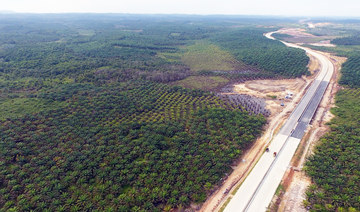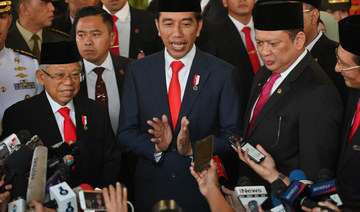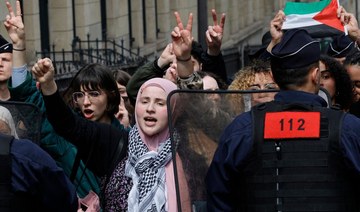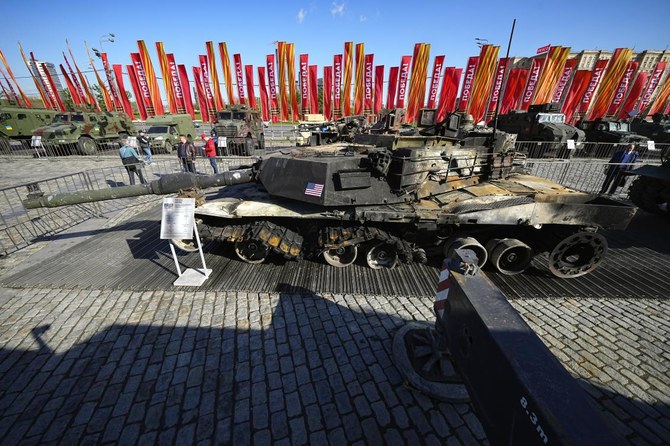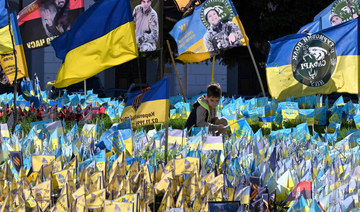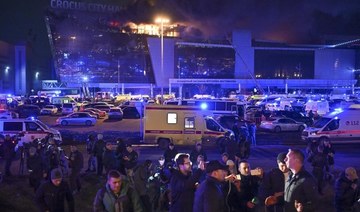JAKARTA: Having heard for months from the media about government plans to move the administrative capital from Jakarta, Indonesians got a clearer picture when President Joko "Jokowi" Widodo formally placed the idea before the country’s parliament in August.
So far, the government has completed part of the spadework in preparation for the transfer: Conducting a three-year study and requesting parliament’s consent for the plan to move the capital to a location in East Kalimantan province, on Borneo, an island Indonesia shares with Malaysia and Brunei.
Jokowi, who began his second and final term on Oct. 20, had formally asked the public to sign off on the plan during his annual state of the nation address in Aug. Ten days later he announced that the government had earmarked 180,000 hectares of land straddling the districts of North Penajam Paser and Kutai Kartanegara in East Kalimantan province for the new capital.
Jokowi has pegged the cost of the relocation of the capital from Jakarta at $33 billion. He claims the government will need to carry only 19 percent of the cost, while the remainder will be taken care of by private investments and public-private partnership schemes.
The National Development Planning Agency, or Bappenas, has fixed 2021 as the year for the groundbreaking of the project. It will launch the transfer process by the end of 2024, the year Joko’s presidential term ends.
Defending the decision to select a site in remote East Kalimantan to be the as-yet-unnamed new capital, Jokowi has said that it will spur regional development and reduce economic disparity between Java and other parts of Indonesia.
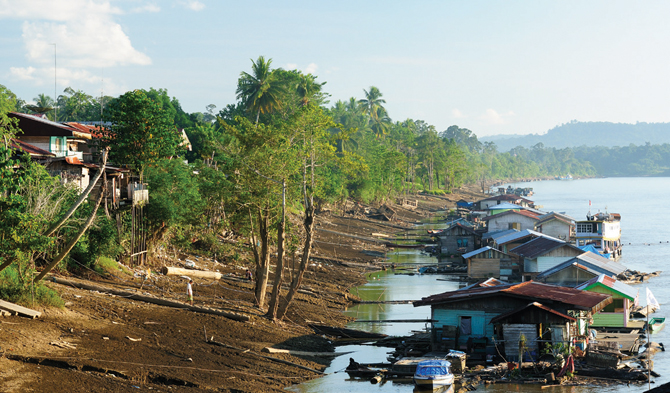
Coastal village in East Kalimantan, where the new Indonesian capital is proposed to be relocated. (Shutterstock)
Jokowi, whose re-election was partly propeled by a vigorous infrastructure drive, has also said the new capital’s location will be strategic: in the country’s middle in addition to being close to two developing cities — Samarinda and Balikpapan — which have the advantages of a major seaport and international airports.
The government also said that East Kalimantan is less prone to natural disasters because the island is not part of the Pacific Ring of Fire. By contrast, Sumatra, Java and other islands on the southern side of the archipelago are dotted with active volcanoes and prone to earthquakes and tsunamis.
The downside, however, is that East Kalimantan and its neighboring provinces are prone to man-made disasters. The annual forest fires caused by slash-and-burn land-clearing methods — mainly for palm oil plantations — produce thick smog, which creates a toxic haze in places as far away as Sabah and Sarawak in Malaysia’s part of Borneo.
The problem is compounded by a combination of easily burned peat lands and a long-drawn-out dry season. Satellite images show that East Kalimantan is one of the provinces with the highest number of hotspots, or areas where fires are detected.
Greenpeace, the environmental watchdog, has pointed out that during the 2015 forest fires, 3,487 hotspots were found in the Kutai Kartanegara district alone.
Leonard Simanjuntak, Greenpeace Indonesia’s country director, said that environmental concerns should be taken into consideration before the capital is relocated from Jakarta.
INNUMBERS
$40.1 BILLION - Budget allocation for Jakarta’s urban revamping.
$33 BILLION - Cost of building the new capital.
1.5 MILLION - Expected population of new capital.
1,300 KILOMETERS - Distance from Jakarta to site of new capital. 1-15cm Annual rate of Jakarta’s surface subsidence.
1957 - Year first President Sukarno floated the idea of moving the capital to Kalimantan.
“The threat posed by the global climate crisis or the environmental mismanagement of Jakarta should not be a reason to cut and run by moving the capital,” he told Arab News.
“However, it must provide a wake-up call and become a major consideration in Indonesia’s development strategy going forward. The relocation of our capital will only shift environmental problems or create new ones,” Leonard told Arab News.
The government, though, envisions the new capital as a city built from scratch, with at least 50 percent green spaces; less dependence on private vehicles thanks to an integrated public-transport network, bicycle lanes and wide pedestrian paths; buildings with green designs; renewables meeting part of the energy requirements; and “smart” water and waste management systems.
Despite its determination to go ahead with the capital transfer, the government has yet to rally public opinion behind the idea.
A survey conducted by Kedai Kopi, a political pollster, in August showed that 95.7 percent of respondents who were from Jakarta disagreed with the idea of transferring the capital.
Across the country, the percentage of respondents who did not support the idea was 39.8 percent. This was higher than the number of respondents who agreed with the plan (35.6 percent) and who had no opinion on the issue (24.6 percent).
“It is no wonder that most respondents from Jakarta disagreed with the plan since they would be the most impacted by the move,” Kunto Wibowo, the executive director of pollster Kedai Kopi, told Arab News.
The concerns are well founded. Jakarta is notorious for its traffic congestion and worsening air quality in addition to being a sinking city due to land subsidence (at a rate from 1cm to 15cm annually).
In another national survey, conducted by pollster Median, 45.3 percent of 1,000 respondents did not agree with the capital-transfer idea compared to the 40.7 percent who agreed.
Rico Marbun, executive director of Median, said in a statement that 58.6 percent of respondents felt the government ought to tackle more pressing issues, notably a stagnant economy, poverty and public welfare, unemployment and lack of opportunities; social unrest in Papua and West Papua provinces, and infrastructure.

A view of a heavily mined and logged forestland in East Kalimantan, where the proposed new capital of Indonesia is to be located. (Shutterstock)
Speaking to Arab News, Nirwono Joga, an urban planning expert at Jakarta’s Trisakti University, said: “If there were funds available to develop a new capital, it would be wiser to divert it to accelerate urban development in other cities.
“We can’t stop people from moving to Jakarta but we can avert it by developing new economic zones outside the greater Jakarta area and outside Java.”
For his part, Jokowi has been assuring Indonesians that Jakarta will not cease to be a government priority.
“Jakarta will continue to be developed as an international and regional business, finance, trade and service hub,” he said.
“The city administration has allocated 571 trillion rupiahs ($40.1 billion) for urban regeneration in the city. The plan is ready for execution.”
An estimated 10 million Indonesians live in Jakarta proper. If the population of the satellite cities is included, many of whom commute into the capital every day, the total figure is 30 million.
The principal city of Java, Indonesia’s most populated island, Jakarta is home to about 149 million people — or more than half of the country’s total population.
As such, Jakarta’s status as Indonesia’s business and finance capital is not under any immediate threat.
It will also continue to be the diplomatic capital of the 10-member Association of Southeast Asian Nations (ASEAN). A new secretariat building of ASEAN’s headquarters in Jakarta was inaugurated on Aug. 8, ASEAN Day, to mark the bloc’s formation in 1967. Of the 93 ambassadors accredited to ASEAN, 74 are currently based in Jakarta.
“The secretariat will not be moving to Kalimantan because we just got a new building,” Lim Jock Hoi, ASEAN’s secretary-general, said at the ASEAN editors’ roundtable of the Economic Research Institute for ASEAN and East Asia (ERIA) in Bangkok, Thailand, on Oct. 6.
“We will strengthen our presence in Jakarta and there’s no way that we can move to Kalimantan if the capital is there.”
Beyond the diplomatic, economic and strategic arguments, Jakarta has a certain intangible edge over other Indonesian cities. As Fadli Zon, a former deputy House Speaker, pointed out recently, it is the city where the country’s independence was declared and the state ideology Pancasila developed, as well as where the constitution was formulated and drafted.
“This collective memory is what unites us as a nation,” he said.




